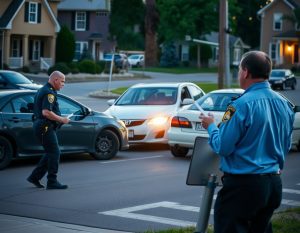In August, we wrote a post introducing premises liability in Illinois. Recently, the U.S. District Court for the Northern District of Illinois had the chance to apply the principles we described in that post to an actual case, Ochoa v. Menard. Here’s what happened, what the court decided, and what you can take from it.
What Happened in Ochoa v. Menard?
Menards is a home improvement store with multiple locations throughout the Chicago area. In September 2009, Rogelio Ochoa visited the Menards on West North Avenue. While there, Ochoa proceeded to the restroom. On his way, he came across a Menards employee restocking particle boards.
Near the employee were two flatbed carts and a shopping cart, all loaded with merchandise, and mostly blocking the aisle. To get through the aisle, Ochoa turned sideways to cut between the carts. However, he slipped on a plastic corner protector for the particle boards and fell, catching himself with his hands.
After getting back up, Ochoa completed his shopping, checked out, and drove himself home.
He later hired an Illinois personal injury attorney to sue Menards on a theory of premises liability, claiming that the corner protector was a dangerous condition that Menards had a duty to correct, and that it was therefore liable to him for the injuries he sustained in the fall.
What Did the Court Say?
Before trial, Menards moved for summary judgment, arguing that the plastic was an open and obvious danger. (Summary judgment is a way to cut a lawsuit short by showing that there is no “genuine dispute” about a “material fact”—i.e., the parties’ disagreements don’t actually affect the outcome of the lawsuit.)
The court summarized the Illinois law of premises liability as follows:
A possessor of land is subject to liability for physical harm caused to his invitees by a condition on the land if . . . he (a) knows or by the exercise of reasonable care would discover the condition, and should realize that it involves an unreasonable risk of harm to such invitees, and (b) should expect that they will not discover or realize the danger, or will fail to protect themselves against it, and (c) fails to exercise reasonable care to protect them against the danger.
But the court also pointed out that Illinois recognizes the “open-and-obvious rule,” one of the defenses we discussed in our last post. The court explained:
A possessor of land is not liable to his invitees for physical harm caused . . . by . . . any condition on the land whose danger is known or obvious to them, unless the possessor should anticipate the harm despite such knowledge or obviousness.
In the end, the court concluded that the danger posed by the Menards employee’s restocking activities was just such a danger. “The aisle was not in a neat and orderly fashion due to [the employee’s] stocking activity,” the court explained. The reasonable person, according to the court, would appreciate the risk that “stray objects” are on the floor in such circumstances.
Consequently, the court granted Menards’ motion for summary judgment, ending Ochoa’s lawsuit.
What Can We Learn from This Case?
Like most premises liability cases, one important lesson to take from this one is to be aware of your surroundings. Just because you’re on someone else’s property doesn’t mean the law requires them to guarantee your total safety, and it’s better to avoid injury in the first place than have to rely on the courts for post-injury compensation.
If you’ve suffered a personal injury like Ochoa did, call the experienced Illinois personal injury lawyers at Costa Ivone today for a free initial consultation.



